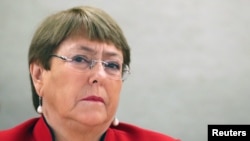Ahead of Human Rights Day on Thursday, the U.N. high commissioner for human rights warned that the politicization of the coronavirus pandemic was undermining a range of such rights, from economic, social and cultural rights to civil and political rights.
The coronavirus has wrecked the lives and livelihoods of hundreds of millions of people. Globally, the pandemic has infected more than 68 million people and killed more than 1.5 million, according to Johns Hopkins University. Wider distribution of vaccines is on the horizon, providing hope that the pandemic soon will be consigned to the history books.
But U.N. rights chief Michelle Bachelet said a medical vaccine would not prevent or cure the pandemic's socioeconomic damage. She said the only thing that could accomplish that was what she called the “vaccine of human right.” Its core ingredients, she said, are embedded in the Universal Declaration of Human Rights, celebrated on Human Rights Day.
The declaration contains important international treaties that protect the rights of specific groups, including children, women, the disabled and migrant workers.
Unfortunately, Bachelet said, the failure of many countries to take the coronavirus seriously and to act quickly enough to prevent its spread has eroded these rights and protections.
“Astoundingly, even to this day, some political leaders are still playing down its impact, disparaging the use of simple measures, such as wearing masks and avoiding large gatherings. ... Politicizing a pandemic in this way is beyond irresponsible – it is utterly reprehensible. ... Scientific evidence and processes have been discounted, and conspiracy theories and disinformation have been sown and allowed – or encouraged – to thrive,” she said.
Damage to trust
Bachelet said these actions have damaged trust between and within nations. She said this has allowed discrimination, systemic racism and marginalization of the most vulnerable people in the world to flourish.
In countries in conflict, she said, COVID-19, the disease caused by the coronavirus, "has added an additional layer to already multifaceted human rights calamities. In Yemen, a perfect storm of five years of conflict and violations, disease, blockades and shortage of humanitarian funding, set against an existing backdrop of poverty, poor governance and lack of development, is pushing the country remorselessly towards full-scale famine.”
Bachelet said the pandemic has left the world exposed, vulnerable and weakened. But she said governments could turn this situation around if they had the political will to put the right policies in place.
Bachelet said leaders in powerful countries must recognize that global challenges can be met only through global cooperation. She noted that no one was safe until everyone was safe.
She said governments must put their narrow, nationalistic responses aside for the good of all. The first test of this, she said, will be their willingness to ensure new COVID vaccines and tools reach everyone who needs them—poor and rich alike.




